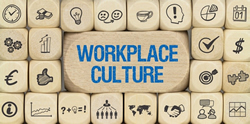Catherine Mattice* says a deteriorating workplace culture often goes unrecognised until it is too late — but there are always ways in which it can be repaired.
 Culture exists whether you are managing it or not.
Culture exists whether you are managing it or not.
Most of our clients come to us when the culture has become negative, and our job is to help clients move to a more positive place.
At the same time we try to teach them how to continue to build in a positive direction long after we’re gone.
This is how we do it.
Phase One: Disengaged and Demoralised.
At this stage, employees believe they are not valued and so they are disengaged.
Burnout, poor management, harassment or bullying, or lack of direction are all examples of contributors.
Sadly, many organisations have no idea they are in this stage, and those who do often attempt to resolve the problem with training and setting rules.
Phase Two: Catalyst Event.
If an organisation hasn’t yet recognised a problem, it will when the ‘big event’ occurs.
This event is often what drives our clients to us, now that a hostile work environment complaint has been filed, for example.
Many times, HR has been trying to convince the Chief Executive to make changes long before the ‘big event’.
Unfortunately some Chief Executives don’t see the value in ‘people initiatives’ because the return on investment can be elusive.
Phase Three: Address the symptoms (but not the root cause).
Now that something has happened, leaders start trying to figure out what to do next, and may be feeling confused.
Leaderships’ confusion causes confusion for employees, because they knew there were problems the whole time but likely felt unable to report them given the culture.
Lost on what to do, many organisations offer training.
Without a culture to support the learning objectives, training will have minimal impact that won’t last very long.
Some organisations will just keep trudging forward, treating the ‘big event’ as a one-time thing.
We have noticed that one employee’s story is more often than not many other peoples’ stories too.
Phase Four: Game Time.
The organisations who choose not to go back to Phase One and instead make changes are ready to take the first steps towards culture change.
Our work starts with an assessment so we can understand what happened and why, and create a plan focused on solving what we learned.
At this point, leadership has to take responsibility for where the organisation is and promise to do whatever it can to make it better.
Only then can everyone shift their focus to strategic design of culture.
At this stage, it’s about figuring out the vision for the future, and creating steps to get there.
Phase Five: Keep on Keeping On.
Culture change is a long process, because it’s about removing hold habits and instilling new ones, creating new processes, and training people to act correctly in a new culture.
Culture change is a series of small and big steps, one after the other, and so it may take a while to feel change.
Until it is felt, people may not believe in the change or that it’s making any positive difference for them.
We often find that after a year, our client’s assessment scores have gone up, but they still have a lot of work to do.
As long as they keep on keeping on, they will get there.
Phase Six: The New Way.
This is the never-ending stage.
Culture can never be ignored, and should be part of the strategic plan, right in there with growth and strategic targets.
Culture is a living, breathing thing that ebbs and flows, and there must always be people in charge of keeping it on course.
We always recommend a team of employees with a few managers and leaders sprinkled in, so that the entire organisation is represented.
Culture change can be intimidating.
It can be messy and emotional, ugly and sad, but positive and fun, energising and fantastic.
The journey is worth it, because I promise you this:
Right now in these crazy times, your employees are vying, absolutely dying, for their workplace to be a happy, healthy and safe place to work.
Provide that, and you have changed their world.
* Catherine Mattice is a consultant and trainer who assists organisations develop action plans to build positive corporate cultures. She can be contacted at www.civilitypartners.com.
This article first appeared on Catherine’s blogsite.











